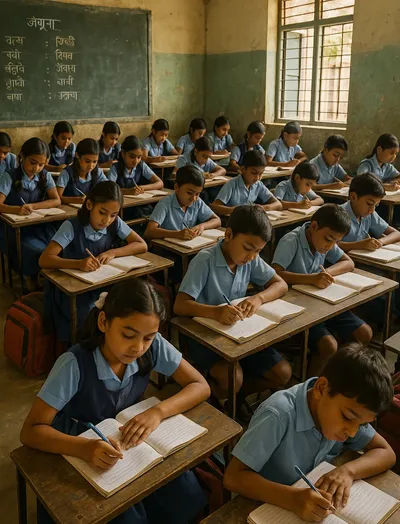
This law came into effect in 2009, establishing free education as a fundamental right for every child in the country.
The Act provides free and compulsory education to all children from the ages of 6 to 14 in a nearby government or aided school.
Key Features:
- Free Education: No tuition, books, uniforms, or exams charged until Class 8.
- Compulsory by government: The government has to provide schools and ensure that every child goes to school.
- Private schools: Have to reserve 25% of seats for poor and disadvantaged children in Class 1 (or preschool).
- No fail: Children will not be held back or expelled until Class 8.
- Quality standards: Schools must meet basic standards in areas like teacher-student ratio, infrastructure, and trained teachers.
- No donation or screening: No admission fees and no testing/interviewing of children.
This law is a big step for ensuring equal educational opportunities for all children in India.
FAQs – RTE Act, 2009
-
1. What is the RTE Act?
-
It is a law through which children (6–14 years) are given the right to free and compulsory education in India.
-
2. Who is covered under this Act?
-
Any child between the ages of 6 and 14 years in India.
-
3. What does free education mean under RTE?
-
No school fees, no charges for uniforms or books, and no charges until Class 8 in government or approved schools.
-
4. What does compulsory education mean?
-
The government will ensure that every child reaches school and completes elementary education.
-
5. Is private schooling free?
-
Private schools shall reserve 25% of seats in Class 1 for economically weaker and disadvantaged groups.
-
6. Who pays for the 25% reserved seats in private schools?
-
The government compensates the schools for those students.
-
7. Can a child be kicked out of school if he is not in possession of a birth certificate?
-
No. Under RTE a child cannot be denied admission merely for the missing documents.
-
8. Are interviews/conducting the tests permissible by schools for the admission process?
-
No. Screening processes, interviews, and only admission donations are disallowed.
-
9. Which classes fall under the RTE Act?
-
Classes 1 to 8 (i.e., ages 6 to 14).
-
10. Does the RTE reform cover preschool or nursery education?
-
Not directly, but several states are starting with the gradual inclusion of this.
-
11. Can a child be expelled or failed under RTE?
-
No children can be expelled or failed until they complete Class 8.
-
12. Are the schools checked for quality?
-
Yes. Schools must adhere to norms regarding infrastructure, teacher qualifications, etc.
-
13. What is the teacher-student ratio under RTE?
-
Ideally, it is one teacher for every 30 students (in primary schools).
-
14. What action can be taken if a school does not follow RTE rules?
-
The school may lose recognition, and penalties can follow.
-
15. Can parents file a complaint against the RTE?
-
Yes. The complainant can file with local authorities or the State Education Department.
-
16. Do RTE rules apply to private schools?
-
Yes, in particular, with regard to the 25% reserved and non-discrimination rules.
-
17. Does RTE allow home schooling?
-
The law entirely speaks about school education; it hasn't been fully debated legally regarding home schooling.
-
18. Do the provisions of the RTE Act apply to madrasas or religious schools?
-
That only applies if they are receiving government aid and may not otherwise apply.
-
19. Can a child join school late under the RTE?
-
Yes. A child can have missed school and join at the right level with special training.
-
20. What happens after the age of 14?
-
The Act only covers until the age of 14; any education gained after that depends on the state policies and other schemes.
Add new comment